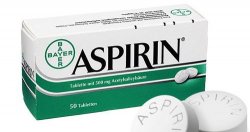Aspirin (acetylsalicylic acid) Coupons and Discounts
Aspirin is a non-steroidal anti-inflammatory agent with analgesic and antipyretic action. One way to save money on the Aspirin (acetylsalicylic acid) retail cost regardless of income and insurance status is to use Aspirin (acetylsalicylic acid) coupons or discount cards from RXCoupons. Use our Aspirin (acetylsalicylic acid) coupons at your online pharmacy and receive up to 75% off the sale price each time you refill your prescription.
What should I know about Aspirin?
Aspirin is a non-steroidal anti-inflammatory agent with analgesic and antipyretic action. The drug comes in tablet form of 500 and 100 mg. The active component of aspirin is acetylsalicylic acid.
Aspirin (acetylsalicylic acid) reduces inflammation, pain and temperature. Keep in mind that Aspirin treats only the symptoms, not the disease. Therefore, it may be used with other drugs to cure the disease.
When should I use Aspirin (acetylsalicylic acid)?
Aspirin (acetylsalicylic acid) is used to treat acute migraine attacks, rheumatic diseases, fever in infectious and inflammatory diseases, pain syndromes of different genesis. Aspirin is also effective in the case of very high temperature. It is prescribed to relieve the pain of different localization and origin (headache, toothache, menstrual pain, neuralgia, etc.). It is used as an anti-inflammatory agent in chronic inflammatory conditions (rheumatism, arthritis, myocarditis, myositis, etc.). Aspirin may be used in low doses for the prevention of thrombosis and embolism.
When I should NOT use Aspirin (acetylsalicylic acid)
The main contraindications for Aspirin therapy include bronchial asthma caused by salicylates and non-steroidal anti-inflammatory drugs, different types of erosions and ulcers, hemorrhagic diathesis, I and III trimesters of pregnancy, age up to 15 years, hypersensitivity to salicylates. Some caution is certainly required in patients with gout, hyperuricemia, ulcerative lesions in the stomach or gastrointestinal bleeding, impaired liver and kidney function, chronic respiratory diseases, asthma, hay fever, nasal polyps.
How should I use Aspirin (acetylsalicylic acid)?
The drug is taken 3 times a day, the interval between doses is 4-8 hours. Patients with impaired liver and kidney functions must either increase the interval between doses or reduce the dose. The single dose for patients with pain syndrome or rheumatic diseases is of 0.5-1 g for adults and children older than 15 years (do not take more than 3 g daily). The maximum daily dose of Aspirin for people older than 65 years is 4 tablets.
The tablets should be taken after meals. It is not recommended to take Aspirin before the meal, because it can cause discomfort and side effects involving the digestive system. Aspirin tablets should be swallowed whole with a glass of water. The drug should not be used more than three days as an antipyretic agent, and more than a week as an analgesic agent.
Aspirin should not be used in children and adolescents younger than 15 years, because the drug can lead to severe, life-threatening complications.
What are the side effects of Aspirin (acetylsalicylic acid)?
Aspirin may cause the following side effects: nausea, epigastric pain, ulcerative and erosive lesions, gastrointestinal bleeding, tinnitus, anemia, skin rash, urticaria, angioedema, bronchospasm, anaphylactic shock.
Aspirin (acetylsalicylic acid) warnings
Patients should refrain from drinking alcoholic beverages during the entire period of treatment. Aspirin should not be used as an antipyretic agent in acute respiratory infections in children under 15 years. The drug can cause very serious complication - Reye syndrome.
Aspirin may induce bronchospasm, asthma attacks and other allergic reactions. Therefore, careful supervision is required during Aspirin therapy.
Aspirin increases the effect of other NSAIDs and narcotic analgesics, hypoglycemic agents, anticoagulants, sulfonamides. It increases the toxicity of methotrexate, reduces the effect of uricosuric agents, antihypertensive drugs and diuretics. Ethanol and corticosteroids may cause the damage of gastric and duodenal mucosa and increase the risk for gastrointestinal bleeding.

